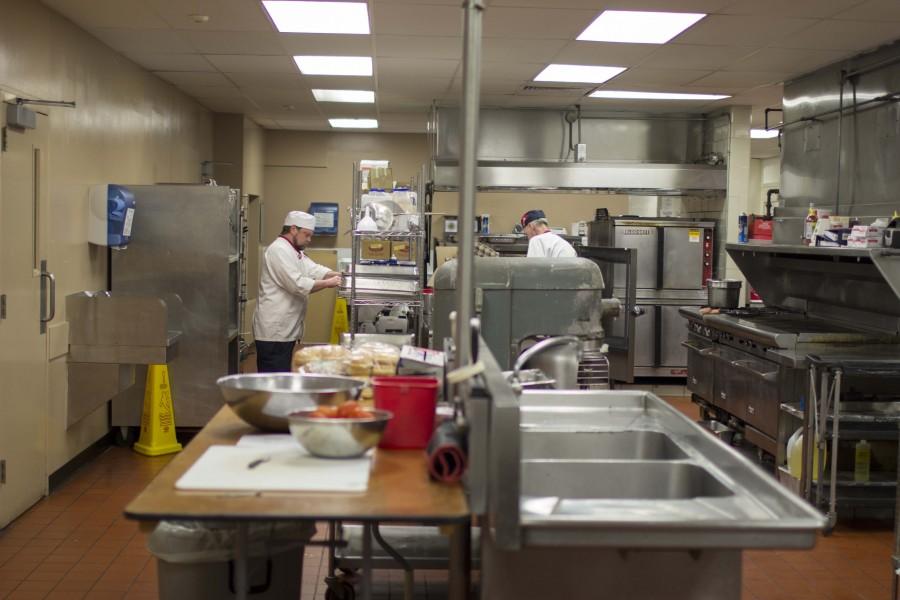Dillin Hall takes time, effort preparing meals
A behind-the-scenes look into meal planning, stocking, and production in the dining hall
Behind the walls of the dining hall cafeteria, chefs and bakers prepare for the next meal.
February 22, 2015
Freshmen and sophomores can find themselves at Dillin Hall more than any other place on campus trying to fit in those important three meals of the day, and as Executive Chef Noah Bekofsky put it, “If you eat at your favorite restaurant every day for two years, it’s not going to be your favorite anymore.”
Thankfully, Bekofsky does his best to make Dillin a varied and accommodating experience for everyone.
Before coming to work at Linfield, Bekofsky was the executive chef for the Fairmont Scottsdale Princess in Scottsdale, Arizona. In
Dillin, he oversees the menu and production in the kitchen.
As a base, the four-week menu they receive focuses on foods that students in the Northwest would hopefully like or at least be familiar with.
Bekofsky takes the menu and changes it in concordance with likes and dislikes of students.
At the same time, Bekofsky adds in new dishes that students may not be familiar with, but he hopes they will like. These dishes then go into the four-week rotation.
“If you don’t know what it is, try it. If you don’t like it, don’t eat it. It’s okay,” Bekofsky said, encouraging students to try foods they may not have encountered before.
One of the reasons it is okay to not finish a meal is that Dillin works with local farmers and ranchers to make sure we have as little waste as possible.
Many have heard about the pig farm where our food scraps go to, but even the cooking oil is collected by a local man who turns it into biodegradable fuel.
As many food suppliers as possible are local, but due to Oregon having a short growing season, the options can be a little limited.
But Bekofsky makes the best of it, buying local mushrooms and other produce when it is in season.
Produce arrives at Dillin five times a week whole and ready for the staff to cut into pieces for consumption. Every day fruit and vegetables are sliced fresh for the salad bar.
In fact, Dillin staff must work together to prepare breakfast for more than 400 people, 600 for lunch and 600-700 for dinner.
This requires a staff broken up into different sections with the grill, pizza, vegetarian, international and other sections.
Most of the staff work eight hours a day to make sure everything runs smoothly.
While the staples are run by full-time workers, students can fill in server positions and others that are necessary mostly during the meal times.
“We are the largest employer for students on campus,” Bekofsky.
At meal times, the Dillin staff is constantly cooking.
Students who want changes to some of the meals being prepared can ask the cooks to remove meat in a portion of the next batch.
Gluten free crust, made at Dillin like the other crusts, is easily available at the pizza station.
“They have that opportunity. All they have to do is ask,” Bekofsky said.
Bekofsky and the rest of Dillin are open to working together with students on activities or special meals for residence halls or clubs or even international students who want to share a piece of their culture.
An exchange student from an African country once set up a whole meal with the help of Dillin to share with the other students.
“It’s all about engagement. I see you guys probably more than you see your roommate if you’re in here three meals a day. There’s no secret curtain,” Bekofsky said.



